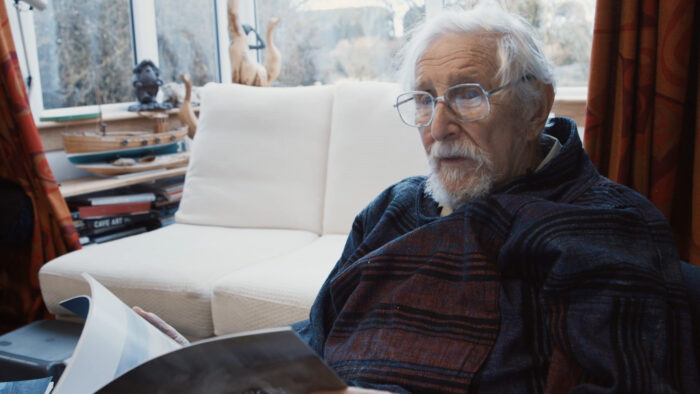Having made his name with a pair of docs outlining Donald Trump's impact on the Scottish landscape (2011's You've Been Trumped and 2016's You've Been Trumped Too), the filmmaker Anthony Baxter now switches focus, from the political to the personal. Eye of the Storm is a portrait of a landscape artist as an old man: the great Montrose painter James Morrison, observed over his final years, as he prepared for a series of retrospectives and came to terms with losing his sight after a long and rewarding life of looking. The exhibition strand is where we get a sense of the Morrison back catalogue, what's gone before. Whether painted in his homeland or Greenland - site of a career-redefining diversion at the turn of the 1990s - Morrison's canvasses absolutely fit and fill Baxter's frames; with their play of light and shade, they're innately cinematic, open to the elements in a way that recalls the more animated stretches in Terrence Malick movies. (You couldn't mistake them for stills, somehow; they're much too alert to the possibility of change, seasonal or otherwise.) It is, however, unlikely there will be much in the way of additions as Baxter joins the artist. Unable to leave the house as frequently as he'd like, with his eyesight the way it is, Morrison is instead filmed pottering about his studio, swapping between specs, sometimes observed from an overhead balcony as he begins work on a new piece. Sporadically, he lets slip a little frustration at the fact the primary tools of his trade have been blunted so, and may over time be taken from him altogether. Yet this gentle, solitary cove (Dorothy, his wife of 51 years, died in 2006) seems to have made peace with his own frailty, in part because he appears to understand transience on some cosmically profound level. Asked why there are no signs of human presence to be found in his work - as they can be in the canvasses of his French and Dutch influences - Morrison shrugs: "The people seem irrelevant to what the landscape is about."
Inevitably, a sizeable tranche of Baxter's film is given over to that which has long been lost: newsreel footage of Glasgow's soot-blackened post-war tenements (no wonder the young Morrison sought to escape into nature); clips of friend and fellow painter Joan Eardley, whom Morrison hymned in a BBC doc shortly after her premature death from cancer aged just 42; the painter's youth and middle-age, preserved forever in those TV appearances. Catriona Black's animated inserts, drawing on the Morrison style in their recreations of scenes from the painter's life, offer a bridge between distant past and digital present; a couple of Karine Polwart folk songs take up the themes of both Morrison's paintings and Baxter's film; while sporadic onscreen quotes from landscape luminaries (including Monet, who himself wrestled with the onset of visual impairment) help place Morrison within a longstanding tradition. The other substantial part of Eye of the Storm, however, concerns Morrison's legacy, which would appear - at least to these eyes - to be considerable indeed. The finished works in those retrospectives are only the half of it; even those scenes where Baxter finds Morrison at the easel are concerned with the passing-on of wisdom - how to do a Morrison cloud, say, and why it's best not to leave your canvas white for too long. It comes as no surprise to learn that Morrison worked for many years at Dundee's Duncan of Jordanstone College of Art and Design; as he puts it, "I couldn't go a quarter of a mile from here without bumping into someone I taught". It's very touching to discover that his offspring John is an art historian: how wonderful that a son should have studied to understand - and be able to communicate - exactly where his father was coming from. The film itself is its own legacy of sorts: humble, unflashy, guided by Morrison's personality as much as anything. (In one of those old BBC shows, he can heard confessing "I'm not proud of what I've done", causing Baxter to ask Morrison whether he has a heightened capacity for self-criticism.) Baxter's Trump docs were driven by legitimate ire; Eye of the Storm demonstrates this filmmaker can be just as effective around a subject who inspires such obvious and palpable love.Eye of the Storm will be available to stream from tomorrow via the Modern Films website.

No comments:
Post a Comment